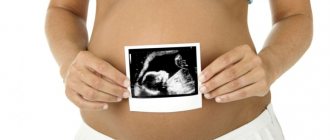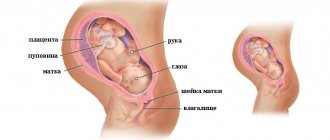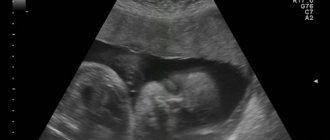Changes in a woman's body
At this time, significant changes continue to occur in the female body.
Table: changes in different body systems
| System | Changes |
| Sexual | During the eighth month, the uterus rises to the ribs, now it is at a height of 38–40 cm above the pubic joint. Therefore, the expectant mother often feels short of breath, and the baby pounds his legs literally right under his heart. In addition, many women notice an increase in vaginal discharge. There is no need to be afraid of this: normally they look whiter and do not cause any discomfort. The main thing is that the discharge does not contain any admixture of blood or pus (in the latter case there will be a greenish tint) |
| Endocrine | Due to changes in hormonal levels, a pregnant woman may experience an increase in the amount of hair on her skin (more hair grows than falls out). There is no need to worry about this: after childbirth, the “extra” hair will disappear, and many mothers will also worry that a lot of hair remains on the comb. These are all natural processes |
| Digestive | Increased digestive problems: symptoms of heartburn, bloating increase, and constipation occurs more often. To reduce discomfort, a pregnant woman needs to carefully follow the principles of proper nutrition and avoid foods that provoke disorders. |
| Blood | Bleeding gums and nosebleeds are often observed. This is also normal and is due to blood thinning so that the fetus does not have nutritional problems |
At the 8th month, the uterus rises very high - 38–40 cm above the pubic joint
The pregnant woman's weight continues to increase (the increase is approximately 300–400 g per week). If the increase is over 500 g, perhaps this indicates hidden edema. The doctor should definitely pay attention to this.
On average, by the end of the 8th month, a woman gains 8–13 kg in weight. Moreover, the increase is often greater for those who weighed little before pregnancy.
As for the size of the abdomen, this is an individual indicator for each woman. At 8 months, some have simply huge bellies, while others have quite miniature ones (the pregnancy develops normally).
Classification of prematurity
The division into degrees of prematurity is based on the gestational age at which the baby was born, as well as on such physical parameters of the toddler as weight and body length. The following degrees of prematurity are distinguished:
- First - the child is born at 36-37 weeks of pregnancy with a body weight of 2 to 2.5 kg and a body length of 41 to 45 cm.
- Second - the baby appears at a period of 32 to 35 weeks, its body weight is less than 2 kg, but more than 1.5 kg, and its body length is from 36 to 40 cm.
- Third - the baby is born at 28-31 weeks of gestation with a weight of 1 to 1.5 kg and a body length of 30 to 35 cm.
- Fourth - the baby is born before 28 weeks of pregnancy with a weight of less than one kilogram and a body length of less than 30 cm.
The most unusual and truly magical stories about the survival of premature babies are here:
Complications that may occur in the 8th month
A pregnant woman should know what complications are potentially possible in the 8th month.
Preeclampsia
At the 8th month, such a formidable complication of pregnancy as gestosis may appear (it is also called late toxicosis). Various factors can contribute to this: high blood pressure, kidney pathologies, diabetes mellitus, heredity, stress, multiple births, the age of the expectant mother (too young or, on the contrary, mature).
Symptoms of gestosis are severe swelling (they can be determined, among other things, by excessive weekly weight gain - more than 500 g). At the same time, the woman cannot take off her wedding ring, notices marks on her legs from the elastic bands of socks, and on her stomach from underwear. Also signs of the disease are protein in the urine and increased blood pressure.
In severe cases of gestosis, headaches, tinnitus, spots in front of the eyes, nausea, vomiting, and pain in the stomach area also appear.
The insidiousness of the disease is that it may not cause obvious swelling, the woman may not feel increased blood pressure, and the headache occurs only at a late stage.
At the 8th month, a pregnant woman may encounter such a dangerous complication as gestosis
Without treatment, these disorders can lead to eclampsia, a fatal condition for the mother and fetus. It manifests itself as sudden severe convulsions and loss of consciousness due to cerebral edema.
Timely treatment will help to avoid dire consequences. A pregnant woman, as a rule, is placed in a hospital; she is prescribed bed rest and extreme rest (getting up is allowed only to eat and go to the toilet). You should lie on your side to make it easier for the kidneys and increase blood flow to the placenta. If drug therapy does not improve the patient’s condition, then doctors decide on early delivery.
Premature maturation of the placenta
Another alarming condition is premature maturation of the placenta (its aging). In this case, the fetus does not receive enough nutrients and oxygen, as a result, it begins to experience hypoxia and developmental delay occurs.
In total, there are 4 degrees of placenta maturity:
- Zero. Up to 30 weeks. The placenta membrane is smooth, straight, and the structure is homogeneous.
- First. Up to 34 weeks. The membrane is slightly wavy; single echogenic inclusions are formed in the structure.
- Second. Valid until the 37th week. In some places, the placenta is already thinning, covered with calcareous (salt) deposits, and there are numerous echogenic zones. However, it continues to perform its functions.
- Third. The structure becomes lobulated, the echogenic structures are already large, partially fused, the depressions reach the basal layer.
In the third degree, the placenta is normal only from the 37th week, but in some women it ages earlier - at the 8th month
Infections that primarily affect the reproductive system (for example, genital herpes) can provoke pathology. In addition, taking medications can have an effect (which is why it is dangerous to prescribe them yourself, for prevention, including vitamins).
This disorder is also typical for pregnant women with bad habits (smoking, alcohol abuse).
It is impossible to determine the symptoms of the disorder on your own. This is done using ultrasound. If there are negative changes, doctors decide on hospitalization with careful observation or an urgent caesarean section (if the child has acute hypoxia or severe developmental delay).
Medical examinations at the eighth month
During routine visits to the antenatal clinic, the doctor measures the woman’s weight, uterine circumference, blood pressure, listens to the fetal heartbeat, and examines the expectant mother’s limbs to assess the degree of swelling. Before each visit to the gynecologist, a woman still takes a urine test to detect protein and sugar. Also at this time, a biochemical blood test is repeated (previously it was carried out in the first trimester).
At the end of the 8th month, the gynecologist will conduct a routine examination of the pregnant woman in the chair and take a control smear to detect infections.
It is at the 8th month that the third planned ultrasound is usually performed. It not only evaluates the development of the fetus, but also determines the degree of maturity of the placenta (to exclude its premature aging), the condition of the cervix, the size of the uterus, and the amount of amniotic fluid. Ultrasound records the presentation of the fetus and the location of the umbilical cord (whether there is any entanglement).
8th month - time of the planned third ultrasound
Consequences of prematurity and viability
The survival rate of prematurely born babies depends on the duration of pregnancy and the reasons that triggered the birth. If those born at 23 weeks survive only in 20-40% of cases, then babies with a gestation period of 24-26 weeks survive in 50-70% of cases, and the survival rate of babies whose development period is more than 27 weeks exceeds 90%.
Babies born earlier than expected gain weight and grow in length very rapidly. Many of them catch up with their full-term peers in these indicators by 1-2 years, but there are babies whose differences with their peers are smoothed out only by 5-6 years of age.
Anemia during prematurity develops more quickly. The risk of sepsis and purulent infections of the bones, intestines or meninges in premature babies is increased. At an older age, children born prematurely are more likely to have neurological pathologies, problems with vision or hearing, frequent acute respiratory viral infections and problems with the genital organs.
Jaundice in babies born prematurely is more pronounced and lasts longer. This physiological condition, which occurs due to the breakdown of fetal hemoglobin, usually resolves by 3 weeks of age, but in many preterm infants requires treatment, for which phototherapy is mainly used.
Extreme prematurity
This is the name given to the condition of babies weighing less than 1 kilogram. They are born in less than 5% of cases of prematurity, often cannot breathe on their own and require artificial and drug support. Even if such babies are cared for, the percentage of disability and various complications in these children is very high.
Extreme prematurity
This condition is observed in infants whose body weight during premature birth is 1-1.5 kg. In order to deliver such babies, it is necessary to use mechanical ventilation, give them oxygen, and administer nutrition into a vein and through a tube. In order for the baby to grow and develop faster, he is given amino acids, glucose, hormonal agents and other substances.
7 months
At this stage of pregnancy, babies are born weighing 1.5-2 kg, but most of them cannot function independently. The little ones are placed in incubators with the required temperature and humidity, they undergo the necessary examinations and are provided with medicinal support. After gaining weight up to 1.7 kg, the baby is transferred to a crib, which is heated. When the child gains weight up to 2 kg, he no longer requires thermal support.
8 months
Babies born at this stage, as a rule, weigh 2-2.5 kg and can suck and breathe independently. They have an increased risk of apnea attacks, so the babies are observed in the hospital for some time, but in the absence of complications and rapid weight gain to normal, the baby is sent home with the new parents.
How premature babies live and develop after birth in modern perinatal centers is described in the video:
Doctors' recommendations for lifestyle in the eighth month
General recommendations from doctors for pregnant women in the 8th month will be as follows:
- Nowadays it is very important to eat right. The choice of products remains, in principle, the same. It is only necessary to increase the content of foods - sources of calcium, which is taken up by the fetus in large quantities, as well as iron-containing foods to prevent anemia (beef, liver, etc.). Meals should be more fractional. After all, the stomach is already compressed by the large uterus, and excess food is thrown into the esophagus, as a result of which the woman suffers from heartburn. For the same reason, immediately after eating, it is better not to lie down, but to stand or walk around. To reduce swelling, you should limit your fluid intake, especially in the evening. It is good to drink cranberry and lingonberry fruit drinks: they have a diuretic effect. You also need to consume less salt.
In the 8th month, it is advisable to limit fluid intake, giving preference to fruit drinks with diuretic properties.
- Rest more often, spend more time outdoors. This is necessary to prevent hypoxia in the fetus. Walking will be leisurely and nearby.
- A woman should sleep on her side, since a large belly already significantly compresses the inferior vena cava when lying on her back.
- Sex. The question of whether sex is permissible during this period is decided individually, in agreement with your gynecologist. If the pregnancy develops safely, then intimate life will only benefit. In case of some problems, sexual intercourse is contraindicated: these are periodic bleeding of an unknown nature, placenta previa, periodic stay of the uterus in tone, damage to the membranes.
In the absence of contraindications, sex in the 8th month is quite possible to have sex
- To avoid anxious thoughts before childbirth, depression, the expectant mother should talk through her fears and doubts with other people, be distracted by her favorite activities, and pay attention to her appearance.
- A pregnant woman does not need to lift weights and travel on public transport should be minimized. If there are no complications, feasible physical activity is allowed.
- At the end of the month, you should start preparing for childbirth. It's time to find a suitable maternity hospital, choose a doctor who will conduct the birth (if this has not been done before).
Reviews about the features of the 8th month of pregnancy
Girls, this is some kind of horror! How did you survive this period? It’s hard for me, I’m so tired from pregnancy that I have no strength! just cry! I can’t even get a good night’s sleep, because I’m surrounded by pillows, I’m hot, as soon as I find a normal position, I immediately want to go to the toilet and this is some kind of curse. The baby constantly hits me, and it doesn’t seem as touching as before, when he pushed, now it’s really painful. I started to feel sick, I no longer had the strength to live, there was some kind of monster inside me.
mimi milaya
https://www.stranamam.ru/post/8777141/
We were born at exactly 8 months, you know, right away he was such a Dwarf, and now we are 9.5, we already say “dad”, “grandma”, we have 5 teeth, and we are running around the hall in walkers in an interesting way - so , don’t be afraid, everything will be fine for you!!!
Olya papko
https://conf.7ya.ru/fulltext-thread.aspx?cnf=Pregn&trd=18528
I have 9 friends who are 8 months old, five of them were born at normal full-term weight. Including me and my brother. They are quite normal people, according to my mother, I gained weight already at three months, I began to walk and talk early.
GalaNTka
https://conf.7ya.ru/fulltext-thread.aspx?cnf=Pregn&trd=18528
I had an emergency CS, my baby was premature. The lungs did not have time to fully form, which caused pneumonia. For the first days, the baby was on artificial ventilation. The sucking reflex is poorly developed, which is why feeding was provided through a tube. And, of course, insufficient body weight.
Apple Juice Lover's Mom
https://deti.mail.ru/forum/v_ozhidanii_chuda/beremennost/8_mesjacev_by_chaplin90_bk_ru/
The eighth month has begun... I guess today I felt it fully. My stomach hurt like I was on my period at night for about five or three minutes. Everything is fine in the morning. Is it them... I was scared of Braxton-Higgs contractions... But I read on the Internet that this is normal, as it turned out...
Pot
https://forum.materinstvo.ru/index.php?showtopic=66555
I'm also in my eighth month. But I also have a little daughter, who takes up so much time that I sometimes forget that I’m expecting a second one. In general, when the belly begins to move and move, it brings such delight, because I understand and remember, by the way, that there is already a real person there! I don’t feel any “hicks”, I sleep great, but I’m gaining weight rapidly and have already crossed the 20 kg mark! I remember from my first pregnancy that the rest of the pregnancy seemed like an excruciatingly long wait. And then I remember how I rushed the event, and when my daughter was born, she began to cause a lot of trouble, and I thought: I’m stupid, I slept as much as I wanted, did whatever I wanted, whenever I wanted. And now everything is different. Enjoy...
sobolkova
https://forum.materinstvo.ru/index.php?showtopic=66555
Opinion of E. Komarovsky
As you know, a popular pediatrician recommends raising children in their first year of life so that the babies do not overheat. Komarovsky always focuses on frequent ventilation, air humidification up to 50-70% in the nursery and maintaining the temperature in the room no higher than +22°C.
However, for premature infants, his recommendations change significantly. Komarovsky supports his colleagues in the opinion that thermoregulation in such babies is poorly developed, so a higher air temperature in the room immediately after discharge (not lower than +25°C), in his opinion, is a necessity.
Until the baby gains weight up to 3000 g, and his age is 9 months after conception, all extreme experiments (in this case, reducing the air temperature to the values recommended by Komarovsky for full-term babies) are prohibited.










